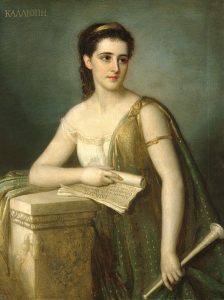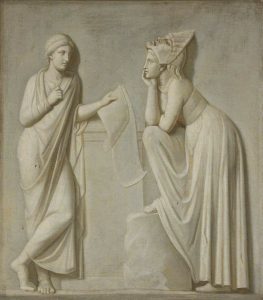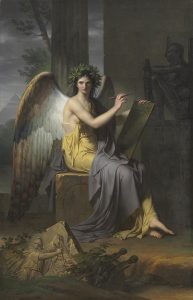Inside The Writing Life: About Those Muses Then
So-o, aways back on April 20 when I posted on Writing The Long Form and WALL #4 Progress, I also mentioned the Muses.
More precisely, I referred to “the Muses” plural, rather than “my muse” singular, and added the following note:
*Muses: re why plural and not singular, ’tis because traditionally the Muses are a sisterhood of nine:
Clio of history
Euterpe of lyric poetry
Thalia of comedy
Melpomene of tragedy
Terpsichore of choral dance and song
Erato of erotic poetry and mime
Polymnia of the sublime hymn
Calliope of epic poetry
Urania of astronomy

Apollo and the Muses pentyptych, by Charles Meynier, Cleveland Museum of Art
If one is to uphold the tradition of the Muses, and if there could “be only one” for The Wall Of Night series, then the by the reckons-of-Helen that one would have to be Calliope, the Muse of Epic Poetry.

Calliope, Muse of Epic Poetry, by Giuseppe Fagnani, Metropolitan Museum of Art
For those who wish to argue that the WALL series ain’t poetry, I concede your point. However, my counterargument would be that back when the Muses resided on Mounts Helicon, Ida, and Parnassus (chiefly) and inspired the creatives of the ancient world, epic was poetry exclusively, e.g. the Illiad and the Odyssey. This, of course, dovetails neatly with my thesis that epic fantasy is a contemporary descendant of epic poetry, a lineage that can be tracked down the centuries through works such as Sir Gawaine and the Green Knight and The Faerie Queene. (To name but a few!)
I might also support my claim to the patronage of Calliope, by arguing that the WALL series can be poetic in its language… 😉 Although that might also necessitate a salute to Euterpe, Muse of Lyric Poetry.

The Muses Euterpe & Melpomene by Robert Fagan: (c) National Trust, Attingham Park; Supplied by The Public Catalogue Foundation
Returning to the sisterhood of Nine, though, although tragedy was—and is—not exclusively epic, many of the great tragedies addressed epic themes and subject matter. In terms of contemporary epic, the converse is also true, so I feel that any self-respecting epic fantasy author must pay respect to Melpomene, the Muse of Tragedy. (See above.)
When it comes to The Wall of Night series, I am always aware that its epic scope and more tragic aspects are strongly informed by history. In that sense, I am always mindful of what is due Clio, the Muse of History, as well.

Clio, Muse of History, by Charles Meynier, Cleveland Museum of Art
So in terms of living inside the writing life, I’m definitely living with Muses plural, rather than singular. Yet although I may argue a case to pick and choose among the nine, I rather suspect that even when you think you’re opening the door to one, it’s all nine Muses that walk through. Certainly, when it comes to writing their gift of story right, I often feel as if it’s not just the one, or even three, but all nine kicking the authorial behind into action and insisting that their creative standards be maintained. 😀
(PS And although I end with a smiley face, as is only right for so lighthearted a topic, you ‘may’ also read it as a wry smile.)







